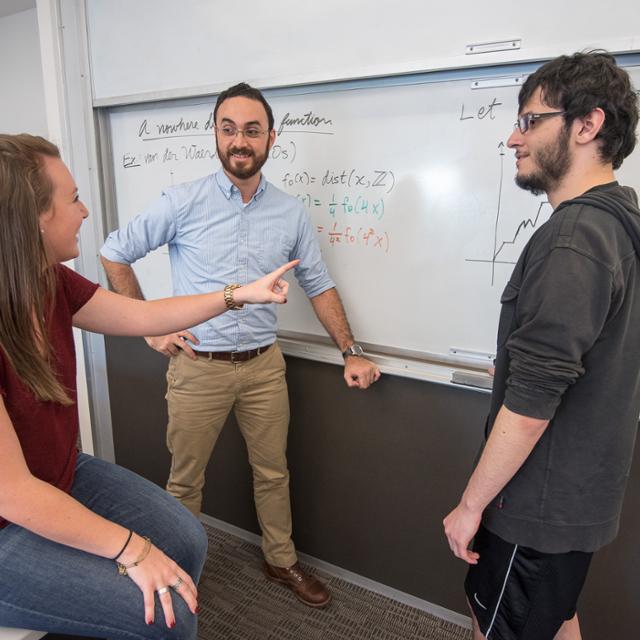BS in Mathematics –Majors Declared Fall 2025 or Later

The Bachelor of Science in Mathematics provides a deeper and more demanding curriculum in Mathematics than the Bachelor of Arts, appropriate for students seeking a technical career or planning to go to graduate school in mathematics or related fields.
Requirements for a Bachelor of Science (BS) declared Fall of 2025 or later
Students must take a minimum of 46 semester hours of mathematics with a grade of C- or better. The required core mathematics courses are:
- MATH 10524 Calculus I
- MATH 20123 Discrete Mathematics I
- MATH 20524 Calculus II
- MATH 30053 Introduction to Mathematical Proof
- MATH 30224 Linear Algebra
- MATH 30524 Calculus III
- MATH 50503 Real Analysis I
Students must take an additional 21 hours at or above the 30000 level. Of these additional hours, 6 hours must be at or above the 40000 level (not including Math 40000 Undergraduate Thesis, Math 40621 Actuarial Internship, or Math 50073 History of Math).
Associated Requirements
Students are also required to take one of the following programming courses:
- COSC 10403 Introduction to Programming
- COSC 10503 Introduction to Programming for Engineering and Science
- COSC 10603 Introduction to Python for Data Analytics
- ENGR 10573 Applied Programming Matlab
- PHYS 20323 Scientific Analysis and Modeling
In addition, students are required to take two of the following:
- COSC 20203 Techniques in Programming
- COSC 40403 Analysis of Algorithms
- COSC 40523 Deep Learning
- ECON 31223 Intermediate Microeconomics: A Mathematical Approach
- ECON 40313 Econometrics
- ECON 40323 Time Series Econometrics
- PHYS 20474 Physics I with Laboratory Mechanics or PHYS 20475 Physics I for Majors: Mechanics
- PHYS 20484 Physics II with Laboratory: Electromagnetism and Optics or PHYS 20485 Physics II for Majors
Credit will not be granted for both MATH 10283 and MATH 10524.
Students must earn a grade of C- or better in each mathematics course for that course to count toward a mathematics degree. Students must also have a 2.0 average or better in their mathematics courses in order to graduate with a degree in mathematics.
Students planning to do graduate work in mathematics are strongly recommended to work closely with an adviser to plan their upper-division electives.
Note: This is an unofficial version of this degree program. For the official version of the degree plan and all other requirements for graduation, please see the TCU Undergraduate Course Catalog.